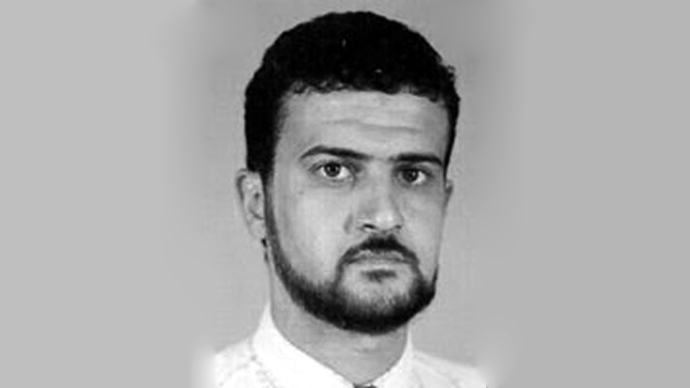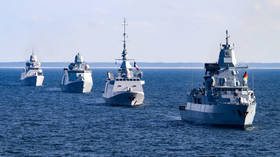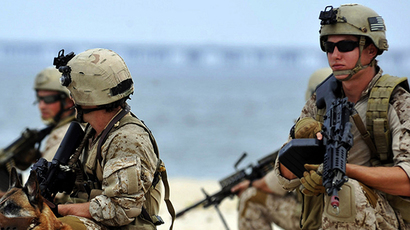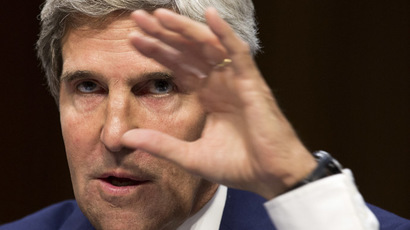Libyan Al-Qaeda suspect suffering from serious illness to be charged in New York

The Libyan man US Special Forces captured from the streets of Tripoli over his suspected involvement with Al-Qaeda terror attacks has been transferred to New York to stand trial but is reportedly hospitalized due to a life-threatening medical condition.
Speaking on condition of anonymity, US officials told the AP that Abu Anas al-Libi, real name Nazih Abdul-Hamed al-Ruqai, is now in the US after spending more than a week onboard a US warship in Libya. He is reported to have a severe case of Hepatitis C, a viral disease that leads to the swelling of the liver.
Libi, 49, has long been under indictment in the US for his alleged role in bombing two American embassies in 1998. He has been on the Federal Bureau of Investigation’s Most Wanted Terrorist list for over a decade, since dual bombings at US embassies in Kenya and Tanzania. The attacks claimed more than 200 lives, 12 of which were American.
Military sources told multiple outlets Libi was captured on October 5 in an early morning operation when he was returning home from a prayer session in the Libyan capital. He was then taken to a Navy ship in the Mediterranean Sea and questioned by the US government’s High-Value Detainee Interrogation Group (HIG) for approximately a week.
There, in international waters, he was classified as an enemy combatant and not granted access to a lawyer. The interrogation was initially expected to last weeks but, according to CBS, al-Libi began refusing food and water, necessitating his relocation to New York.
The HIG was created in 2009 to carry out exactly this type of interrogation. The unit is known to favor international waters because of the lack of legal protection for a suspect, although the permitted tactics are not as brutal as the “enhanced interrogation techniques” carried out by the Central Intelligence Agency a decade ago.
Under current US policy, the HIG is not allowed to waterboard Libi, nor use electric shock, physically hit him, or even threaten to do so. HIG interrogators are permitted to pretend to be people they are not, however, and sleep deprivation is not specifically prohibited under military guidelines, according to national security sources who spoke to ABC.
With news of his arrival on domestic soil, though, Libi is expected to be arraigned in federal court Tuesday, with US officials telling ABC the legal process has been sped up in fear al-Libi will not survive long enough to “see justice served in a courtroom.”
Upon news of his capture last weekend, Libyan Prime Minister Ali Zeidan told Reuters that his government has asked American authorities to “provide an explanation” for what he called a “kidnapping.”
His wife, who has mentioned his Hepatitis C in multiple interviews, told CNN Libi is innocent and that he left Al-Qaeda before the bombings occurred.
“He is clearly Al-Qaeda and he is clearly wanted on charges," White House spokesman Jay Carney said of Libi’s case in response. “When we are able to, we prefer to capture someone like Mr. al-Libi.”
When pressed on whether the operation complied with international law last week US President Obama sidestepped the question.
“We know that Mr. al-Libi planned and helped execute plots that killed hundreds of people, a whole lot of Americans, and we have strong evidence of that and he will be brought to justice,” Obama said.
Just days after the Delta Force landed in Tripoli and brought the suspect into international waters, Libyan Prime Minister Zeidan was reportedly captured by former rebel militia-men who accused him of cooperating with the US to kidnap al-Libi. Zeidan has since been freed, telling reporters after that "Libyans need wisdom … not escalation … to deal with this situation.”
It remains unclear what, if any, cooperation the US government had in the operation, although Libi’s son claimed in news interviews that men who appeared to be of Libyan descent seemed to be involved in his father’s capture. What is known is that the government and national army have been incompetent to the point of irrelevance since Libyan leader Muammar Qaddafi was deposed in 2011.













